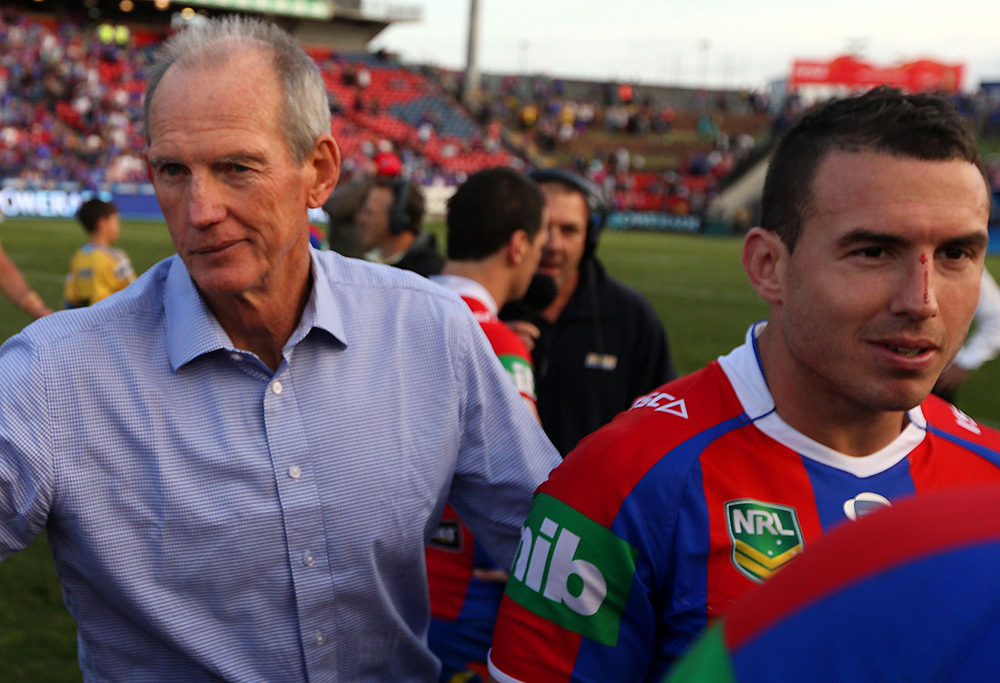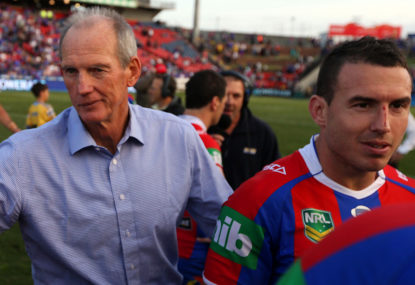Like smashing tequila slammers, consuming habanero sauce or approaching the prettiest girl in the bar, there are some acts people will encourage you to perform which they wouldn’t necessarily rush into themselves.
Having kids belongs in this category.
For the past decade I’ve felt the not-so-gentle nudge from friends, family, colleagues and complete strangers to reproduce.
It’s not all that different from when childhood acquaintances offered encouragement to jump from a second-story window, roof or pergola into the backyard pool.
Sure, they might have done it once or twice themselves, but most times they baited you because they wanted to be entertained by the absolute look of fear on your face as you took the plunge.
The best of your mates, who weren’t necessarily mean-spirited, egged you on because they believed in the concept that a shared source of dread would bring you tighter.
Okay, maybe that’s being a bit too melodramatic of a comparison to fatherhood, but you get the gist.
I’ve developed some stock standard responses to the ‘when are you having kids?’ question that arises every second day.
They range from the flippant retorts:
1. “Really? You think pasty, ginger people should reproduce? Do you know about climate change?”
2. “Based on experience, would you recommend parenthood unconditionally? No? But I should definitely do it, right?”
3. “How much do you enjoy travelling with kids?”
To the negative, defensive, existential responses.
[latest_videos_strip category=“league” name=“League”]
4. “So, if I’m the perfect husband, never set a foot wrong, but my wife grows bored and chooses to leave me, the odds say she’ll get majority control of my own flesh-and-blood?”
5. “How many of your friendship circle speak fondly of their natural father? I’m a grumpy guy. If I was my own kid, even I wouldn’t like me.”
6. “Having kids is the greatest act of vanity and selfishness. Our planet is already overpopulated and you want to place further stress on nature just so you can have a mini-me running around to entertain you? What if that kid doesn’t like the world we’ve created, or has an unhealthy or unfortunate future, and you are responsible for bringing them into it?”
To the positive and aspirational.
7. “I’d rather complete all my objectives and make this world a better place in my lifetime, rather than impart that pressure on to a subordinate.”
8. “There are a lot of unloved kids out there already who need guidance.”
9. “I coach, train and manage several rugby league teams. It’s just like having kids where you don’t have to wipe their bums or argue with them before bed every night. You get to partake in one of the things they most enjoy in life, where the time together is valued, and positively impact dozens and dozens of lives, not just one or two.”
Given most of the populace elects to have offspring, I’m sure many readers are already heading to the comments section below to tap out feisty responses to that list.
But for the purposes of a sporting website, let’s focus on that final point.
Is being a coach of many better than being a dad to a few? Can you ever derive the same level of satisfaction? What scope of influence can you have over the life of someone if you don’t live with them and aren’t connected by blood?
From my personal experience, both as an aspiring player, then later as a mentor, I contend it is possible to have a similarly profound impact.
Note I didn’t say the same impact.
I can remember several coaches who offered a tuition in important life values and self-belief that I would have missed out on otherwise.
The encouragement of one particular trainer when I was 15 I consider almost transformative in its impact.
I can still remember many conversations we had word-for-word, which is a blessing, given he has now passed on to the afterlife.
If had to name the footy coaches that made the biggest positive impression, they would be the following.
• The trainer above, who instilled ambition and belief, while also teaching perseverance, kindness, hard work and reward.
• A coach at age 19-20 who mastered the art of condensing objectives and rebuffed overcomplication or overthinking. In training he would arm you with the full array of skills you needed to win, but his final instructions before a game were always concise, grounding you in the moment.
• Two coaches in my 30s who were more like mates, were positive role models for transitioning to life after footy and reinforced the old adage: ‘People respond not because they care about what you know, they respond because they know that you care’.
On the flipside of that, since I’ve aged I’d also say I’ve felt the preciousness of relationships where I have been the one attempting to impart knowledge, solace or perspective to younger players.
Something as basic as health and nutrition, which is key to everyday function, is an element so many young men and women grow up without.
There’s an overwhelming sense of reward when you can teach somebody to nourish and look after themselves in a way they haven’t experienced previously, or to kick an addiction, or to stop using food as a crutch for other frailties.
You see them become brighter, more alert, happier.
There are guys and girls who have grown up in households where, even though their parents loved them deeply, there was never a priority on things like communication, philosophy, or goal-setting.
They become so entangled in their own thoughts – and with either no means to express it, or nobody to discuss it with – it can manifest itself negatively.

(AAP Image/Action Photographics, Renee McKay)
That ranges everything from repeated bad performances though lack of focus or belief, right through to contemplating self-harm.
Whenever you can help someone get the best out of themselves, it feels amazing. Particularly if it’s across a wide scope of individuals, who emerge through challenges together.
A football club is also about managing relationships, and this learned skill undoubtedly comes in handy whenever players have a relationship they feel needs attention.
You can pass on independent, honest advice they have perhaps been spared by others living closer to the issue.
Recently, for the first time, a player told me he considered me a father figure.
I’m thankful for that from a number of angles, not least of all because at age 39 and coaching guys who are mostly in their mid 20s, it would have felt weird for anybody to have said that beforehand.
But rather than let ego get in the way and consider it an insult, it’s a compliment that provides great pride.
I certainly hope it’s not the last time somebody says it.
Anyhow, what about you? Did you have a coach, trainer or manager who helped bring out the best in you? What did you learn from them that you didn’t learn elsewhere? Would you ever put a coach on par with one of your parents?






























































































